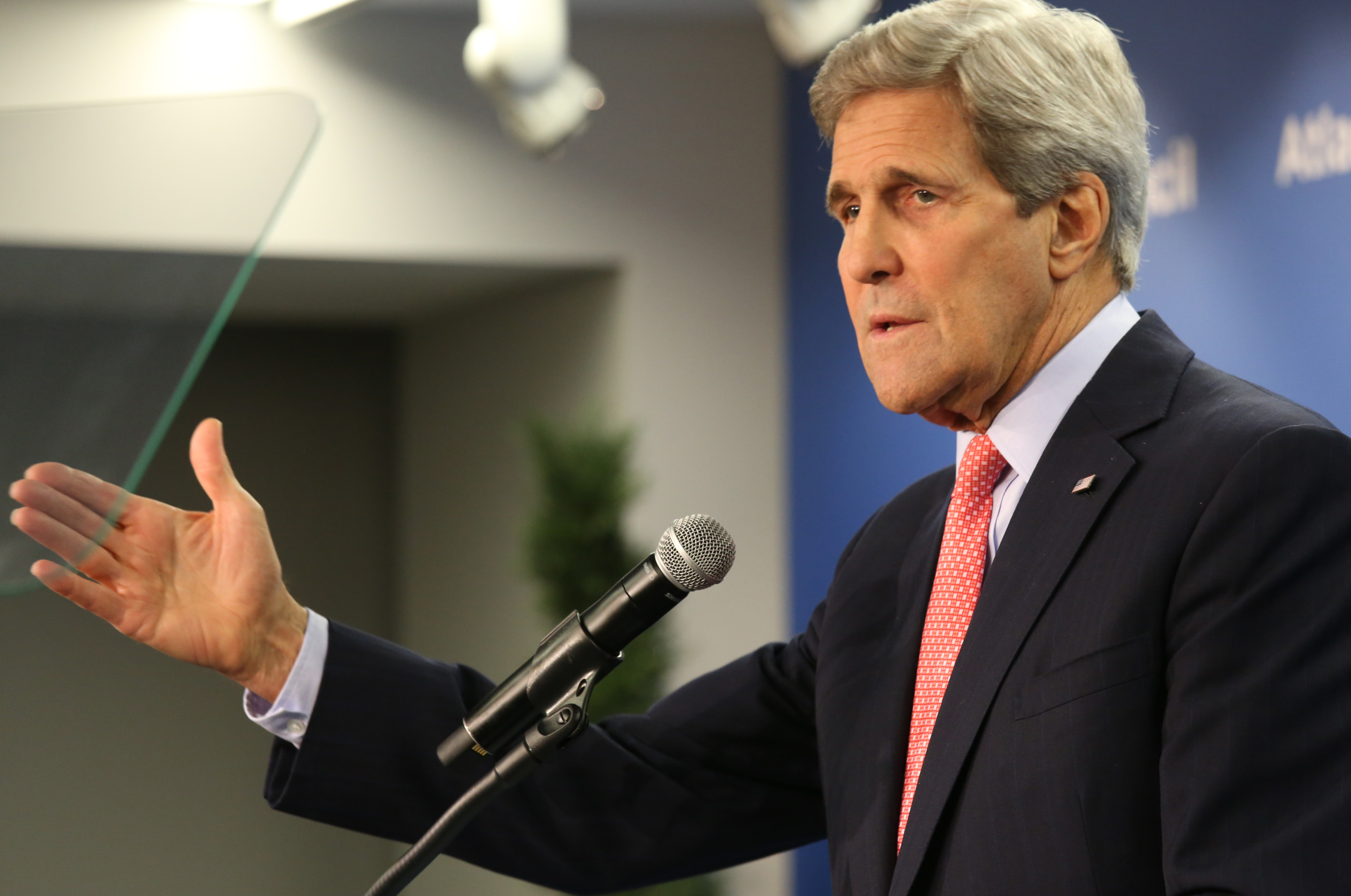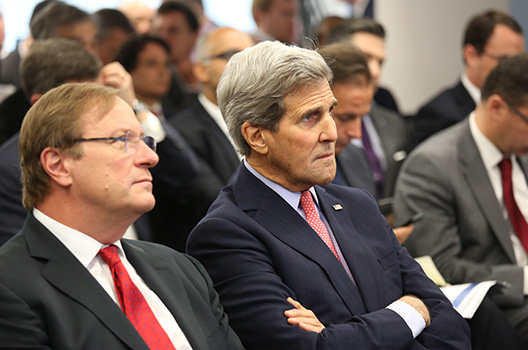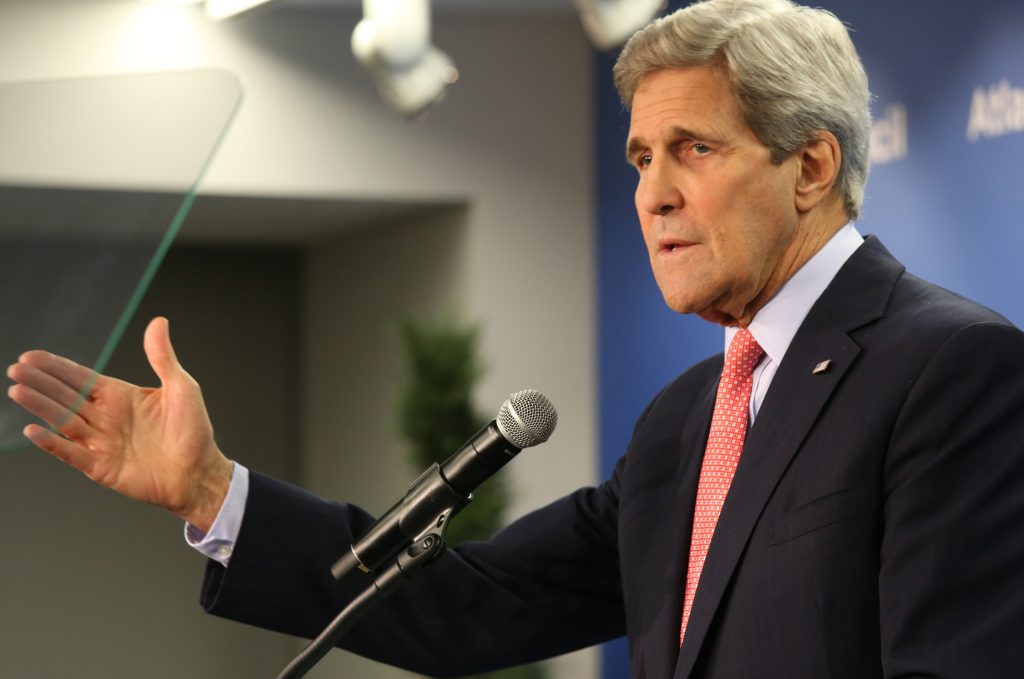
In Atlantic Council address, Secretary of State says case for TPP, TTIP ‘overwhelming’
US Secretary of State John F. Kerry delivered a strong pitch for the Trans-Pacific Partnership (TPP) and the Transatlantic Trade and Investment Partnership (TTIP) April 23, saying the economic case for both deals is “overwhelming.”
A day earlier, the Senate Finance Committee approved a bill granting the White House fast-track authority for future trade deals.
“We have an opportunity before us to shape and elevate the global rules of trade for decades to come,” Kerry said at the Atlantic Council. “In Congress, prominent leaders from both parties are poised to open that door. It is absolutely vital that we do everything to make sure we walk through that door together and get this job done.”
Kerry said passage of the fast-track legislation, the Trade Promotion Authority (TPA), offers “a framework for moving forward on a pair of the most significant trade negotiations in our history.” TPA is a necessary prerequisite before the full House and Senate can vote on either the TPP or TTIP without amendments.
 Atlantic Council President and CEO Frederick Kempe and US Secretary of State John F. Kerry at the Atlantic Council April 23. (Imagelink.com/denniskan)
Atlantic Council President and CEO Frederick Kempe and US Secretary of State John F. Kerry at the Atlantic Council April 23. (Imagelink.com/denniskan)
“It reflects exactly what our nation needs, a bridge over three divides: between the executive and legislative, between the Senate and the House, and between the two major political parties,” Kerry said of the measure, which the Senate panel passed by a 20-6 vote.
If enacted, he insisted, “the new bipartisan bill will fully respect and preserve the rights of Congress, but it will also give the President of the United States the flexibility that he has to have to negotiate credibly and effectively on our nation’s behalf.”
Kerry thanked Sen. Orrin Hatch (R-UT), Chairman of the Senate Finance Committee, as well as the panel’s senior Democrat, Sen. Ron Wyden of Oregon, and Rep. Paul Ryan (R-WI), Chairman of the House Ways & Means Committee, for their support on TPA. Ryan told reporters that with the help of US President Barack Obama, TPA will likely become reality by next spring.
Seven Democrats on the Finance Committee supported the TPA measure, which now goes to the full Senate floor where it’s likely to generate heated debate.
“We could try to build a wall around our economy as big as Fenway Park’s Green Monster, maybe bigger. But it would be a lot more harmful than helpful,” said Kerry, alluding to opponents who claim that all-encompassing trade deals such as TPP help Asian competitors at the expense of American workers. “Instead of walls, what we ought to be building are partnerships and alliances.”
Kerry, whose 29-minute address kicked off the Atlantic Council’s Trade and Security Initiative, addressed an audience that included foreign ambassadors and US lawmakers. It was Kerry’s second visit to the Council this year; on March 12, he spoke on climate change, which he described as “the biggest threat” facing the Earth today.
Yet economic chaos is also a grave danger, and when Obama took office, said Kerry, the United States was in recession and even faced the prospect of another depression.
“The entire financial system was on the brink of collapse. Unemployment was approaching 10 percent, and the housing market was in shambles. But since 2010, US businesses have added 12 million jobs. The single biggest cause of this success is that our exports have reached a record level,” he said. “And when we increase the sale of US goods and services, our payrolls get bigger and our paychecks get fatter.”
In 1993, Kerry—then a US Senator from Massachusetts—supported the North American Free Trade Agreement when it came up for a Senate vote. He cited a Gallup poll showing that 60 percent of Americans today view foreign trade as an opportunity rather than a threat.
“Our environmental and labor standards are among the highest in the world,” he said. “That’s why we have so much to gain and nothing to lose by reaching deals that lower barriers so our business can wind up selling more to other places.”
Even so, opposition to the TPP is strong, particularly among Democrats and organized labor leaders who fear an exodus of manufacturing jobs to low-wage Asian countries. The TPP would remove trade barriers among the United States, Canada, Mexico, Japan and eight other countries that border the Pacific Ocean—though it excludes China.
Sen. Elizabeth Warren (D-MA) opposes TPP. So does Rep. Jim McDermott (D-WA).
“Men and women are understandably upset if they see a company close down and jobs lost. It’s only natural people would look around and in their distress they find something or someone able to blame,” said Kerry. “As a Democrat who won the nomination of my party for the presidency, I understand those tensions as well as anybody.”
He predicted that TPP and TTIP would “reinvent the mix of our economic base” in cities ranging from Boston and Philadelphia to Chicago, Los Angeles, and New York.
“We simply cannot expect our economy to grow and generate new jobs if all we do is buy and sell to ourselves. It ain’t gonna work,” he said. “Trade is a job creator, period, and the record of the past hundred years or more bears that out. As I speak, exports support about 11.7 million American jobs. And that number is only going to go up.”
Kerry added: “If we attempt to stand still, we’re going to get blown away economically. We’ve got to ensure that American workers, farmers and others receive equitable treatment. You can’t do that by sitting on the side of the road while other countries write the rules of trade.”
The Secretary of State listed several US companies that would benefit immediately from congressional passage of TPP and TTIP. Among them:
- Health Enterprises of North Attleboro, Massachusetts, which ships consumer healthcare products to more than 60 countries but is being strangled by bureaucratic issues such as costly re-registration fees in the 28-member European Union.
- Cascade Designs Co. of Seattle, which exports self-inflating mattresses, sleeping bags and other recreational equipment but faces high tariffs in TPP countries.
- Concord Supply of San Antonio, Texas, which sells industrial equipment and depends on patent enforcement in order to keep its products from being copied.
Kerry said proposed legislation attached to both TPP and TTIP “addresses precisely the labor and environmental concerns about which critics have previously complained.”
“We should be using all the diplomatic tools at our disposal. We need to make certain everybody up and down that food chain shares and benefits from this,” he said. “The good news is that our engagement has been welcomed across every ocean, not because we always agree with all our friends, but because we know that our markets—and indeed our very futures—are linked, and that when the chips are really down, our partners will be able to count on us.”
The United States and Europe “are bound together, as Shakespeare put it, by hoops of iron,” he said, and TTIP will help people on both sides of the Atlantic benefit from their combined economic muscle.
Larry Luxner is an editor at the Atlantic Council.
Image: If approved by Congress, Trade Promotion Authority legislation would “fully respect and preserve the rights of Congress, but it will also give the President of the United States the flexibility that he has to have to negotiate credibly and effectively on our nation’s behalf,” US Secretary of State John F. Kerry said April 23 at the Atlantic Council. (Imagelink.com/denniskan)
